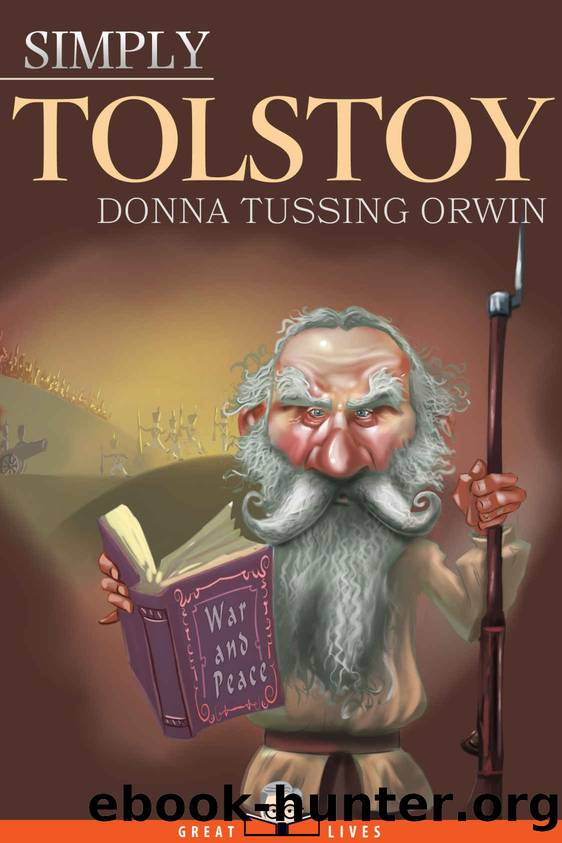Simply Tolstoy by Donna Tussing Orwin

Author:Donna Tussing Orwin [Orwin, Donna Tussing]
Language: eng
Format: epub
Tags: BIO000000, BIO007000, LIT000000, LIT004240
ISBN: 9781943657315
Publisher: Simply Charly
Published: 2017-07-25T04:00:00+00:00
“Church and State” (1879)
A short essay written early in Tolstoy’s quest for religious certainty and not published until much later already attacks the established Church in sharp, precise, and polemical tones. He claimed that the very idea of a church was anathema to Christianity in its original form, and arose from a conspiracy to force everyone to believe the same thing. In truth, he argued, each person is responsible for his own beliefs, and no one has the right to force these on others. Christianity became perverted when it aligned itself with power, specifically with Emperor Constantine. Before that, Tolstoy posited, the word subsequently translated as “church” meant simply an assembly of like-minded people. Charlemagne and Vladimir (the Kievan Russian prince who converted to Christianity in 988) followed the same path as Constantine, making Christianity pagan by absorbing subversive political principles into it. Hence, Tolstoy wrote, “the sanctification of state power by Christianity is blasphemy; it is the ruin of Christianity.” The authority of the priesthood in all state-sanctioned Christianity depends on its original teaching of “humility, self-sacrifice, love, poverty; but the teaching is preached by force and evil.” Tolstoy is distinguishing here between the theological dogmatism that had caused so many battles and crimes in history, and the moral, positive teaching of Christianity, agreed upon by all. Today, according to him, unadulterated Christianity remained in force only among religious dissenters.
******************
In the 1880s, Tolstoy also turned decisively against the idea of government, and there were political as well as personal reasons for him to do so. War and Peace had been written against the backdrop of the so-called Great Reforms instituted by Tsar Alexander II and starting with Emancipation. Even although Alexander II turned conservative, he continued to roll out reforms throughout the 1870s, and, correspondingly, Anna Karenina reflects engagement in contemporary Russian politics. In Part 6, for instance, Levin attends elections for a local assembly as part of the so-called zemstvo system of official consultation by the autocrat with various classes.
Levin disapproves of most of what is happening there, but he participates, and, most importantly, elsewhere he expresses opinions about where he thinks the country should be going. (In the 1870s, Tolstoy himself participated in zemstvo activities related to pedagogy in Tula.) In 1881, Alexander II was assassinated, his son Alexander III ascended the throne, and a period of political repression set in that lasted until 1917. Having established some institutions of local self-government through the zemstvo system, the Romanov tsars still insisted upon retaining ultimate power. Even though certain reforms, mainly economic ones, continued to go forward, every effort was made to roll back political liberalization. A form of martial law originally imposed for three years after the assassination remained in place until 1917. Political rights, especially those of peasants, were curtailed, while the gentry, though in economic decline, was favored over other classes. Education was monitored and, to the extent possible, controlled. Russian nationalism grew and was encouraged by the authorities. Minorities like the Ukrainians and the
Download
This site does not store any files on its server. We only index and link to content provided by other sites. Please contact the content providers to delete copyright contents if any and email us, we'll remove relevant links or contents immediately.
| African | Asian |
| Australian & Oceanian | Canadian |
| Caribbean & Latin American | European |
| Jewish | Middle Eastern |
| Russian | United States |
4 3 2 1: A Novel by Paul Auster(11046)
The handmaid's tale by Margaret Atwood(6852)
Giovanni's Room by James Baldwin(5877)
Big Magic: Creative Living Beyond Fear by Elizabeth Gilbert(4723)
Asking the Right Questions: A Guide to Critical Thinking by M. Neil Browne & Stuart M. Keeley(4574)
On Writing A Memoir of the Craft by Stephen King(4213)
Ego Is the Enemy by Ryan Holiday(3991)
Ken Follett - World without end by Ken Follett(3972)
The Body: A Guide for Occupants by Bill Bryson(3799)
Bluets by Maggie Nelson(3709)
Adulting by Kelly Williams Brown(3668)
Guilty Pleasures by Laurell K Hamilton(3586)
Eat That Frog! by Brian Tracy(3513)
White Noise - A Novel by Don DeLillo(3434)
The Poetry of Pablo Neruda by Pablo Neruda(3366)
Alive: The Story of the Andes Survivors by Piers Paul Read(3310)
The Bookshop by Penelope Fitzgerald(3225)
The Book of Joy by Dalai Lama(3217)
Fingerprints of the Gods by Graham Hancock(3211)
